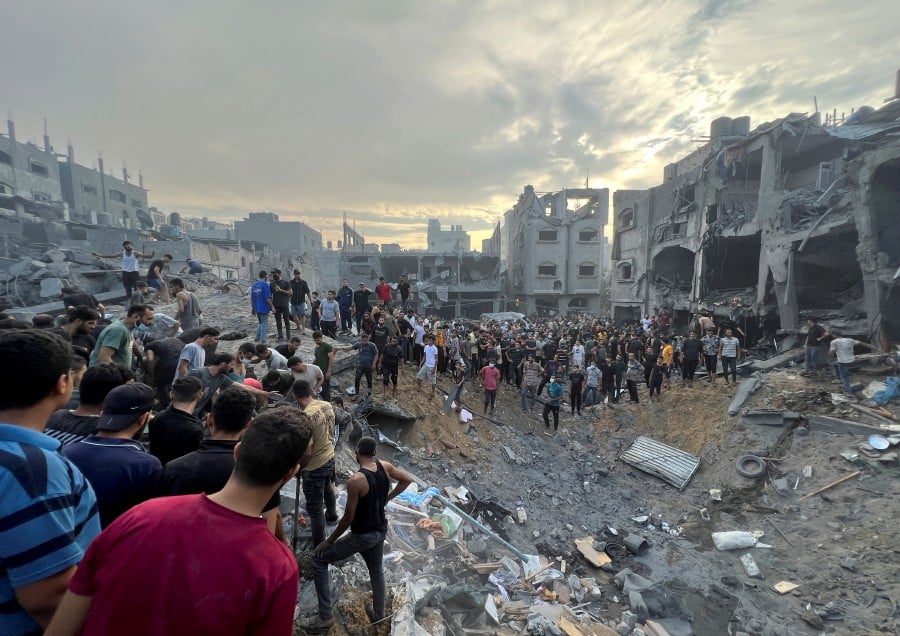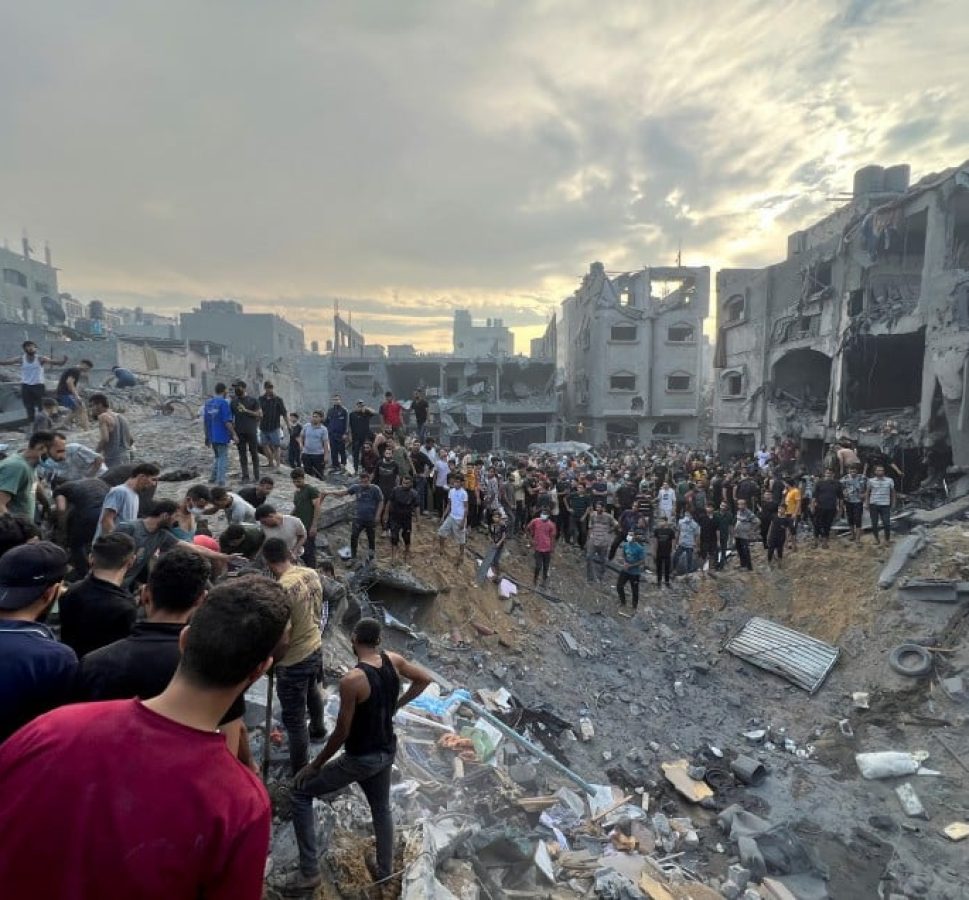
Israeli air strikes on a densely populated Gaza camp have provoked global criticism.
A barrage of Israeli air strikes on a densely populated refugee camp near Gaza City has drawn condemnation from governments and NGOs across the globe.
An attack on Tuesday evening on the Jabalia refugee camp demolished several apartment buildings, leaving craters in their place. Footage from the scene showed women and children being helped down half-destroyed buildings as rescuers and local residents dug through the rubble to find survivors.
The Ministry of Health in Gaza said more than 50 people were killed in the attack and 150 were wounded. The Indonesian Hospital, where most of the victims were taken, confirmed that more than 50 people were killed.
Hamas’s military wing said on Wednesday that seven of its civilian captives have been killed in the strikes, including three foreign passport holders.
“We are still counting the numbers and the people,” Hamas spokesperson Osama Hamdan told Al Jazeera. “We are still trying to find the people under the rubble. Maybe at the end of that, tomorrow, we can talk about the exact numbers and maybe some names.”
Al Jazeera’s Wael Dahdouh reported on Wednesday afternoon that Jabalia had been hit again by intense air strikes.
‘Appalled’
The strikes were denounced by several states as well as the European Union’s top diplomat, Josep Borrell.
The EU commissioner for foreign affairs wrote on the social media platform X: “I am appalled by the high number of casualties following the bombing by Israel of the Jabalia refugee camp.”
In a statement issued by its Ministry of Foreign Affairs, Saudi Arabia condemned “in the strongest way possible the inhumane targeting by the Israeli occupation forces of the Jabalia refugee camp”.
Qatar said the strikes were undermining its mediation efforts to secure the release of more than 200 captives held by Hamas in Gaza.
“The expansion of Israeli attacks in the Gaza Strip to include civilian objects, like hospitals, schools, population centres and shelters for displaced people, is a dangerous escalation in the course of confrontations, which would undermine mediation and de-escalation efforts,” Qatar’s Ministry of Foreign Affairs said in a statement.
The United Arab Emirates said it “reaffirmed the need for an immediate ceasefire” and “underscored that indiscriminate attacks will result in irreparable ramifications in the region”.
Egypt’s Ministry of Foreign Affairs also said it “strongly condemns Israel’s inhumane targeting of an entire residential square in Jabalia camp in northern Gaza that left hundreds killed and injured” while Yemen called on “the international community to take an immediate stance to stop these crimes”.
Interim Pakistani Prime Minister Anwaar-ul-Haq Kakar similarly urged the international community to play its role in ending such attacks.
“Yesterday’s air raid on Jabalia camp, where hundreds of lives were lost, including women and children, was a stark reminder of ongoing Israeli brutalities and war crimes in Gaza,” Kakar said in a statement on Wednesday.
“Such reprehensible acts can never be condoned or forgotten,” he said. “The world must act now to end this carnage.”
Iran’s supreme leader, Ayatollah Ali Khamenei, called on Muslim states to cease oil and food exports to Israel to stop the bombardment of Gaza during a speech on Wednesday, according to Iranian state media.
Meanwhile, without naming Jabalia, some states have begun to distance themselves from Israel. Bolivia has cut diplomatic ties while neighbours Colombia and Chile recalled their ambassadors for consultations.
‘A new low’
Humanitarian organisations also expressed criticism of the attack.
“We are horrified by news coming from Jabalia camp where high numbers of people have reportedly been killed by an Israeli airstrike,” Doctors Without Borders (Medecins Sans Frontieres, or MSF), whose staff was at al-Shifa Hospital, where many of the wounded were treated, wrote on the X social media platform.
“Young children arrived at the hospital with deep wounds and severe burns. They came without their families. Many were screaming and asking for their parents,” MSF nurse Mohammed Hawajreh said.
UK-based Medical Aid for Palestininians (MAP) said Tuesday’s attack should be a “wake-up call”.
“This attack marks a new low and should serve as a wake-up call to world leaders and politicians everywhere,” said Melanie Ward, MAP’s chief executive.
“Their meek requests for compliance with international law are being ignored entirely,” she added. “Israel has instead increased the ferocity of its indiscriminate and disproportionate attacks. One child is being killed every 10 minutes as a result and entire families obliterated.”
Stranded
Although more than half of Gaza’s 2.3 million Palestinians have fled their homes, several hundred thousand remain stranded in the north, where Israeli troops and tanks have advanced on multiple sides of Gaza City.
An Israel army statement said the air strikes on Jabalia had killed Ibrahim Biari, a Hamas commander, whom it said was “pivotal” in the planning and execution of the deadly attacks on October 7 into southern Israel, which set off the latest Israel-Gaza conflict. Hamas spokesperson Hazem Qassem denied any senior commander was in the camp.
So far, at least 8,796 people have been killed in Gaza since the war began, including 3,648 children. The number of child deaths is more than have died in all conflicts around the world in each of the past four years.
More than 1,400 people have died in Israel, mostly in the October 7 attack.
Israeli Prime Minister Benjamin Netanyahu has rejected calls for a ceasefire.






